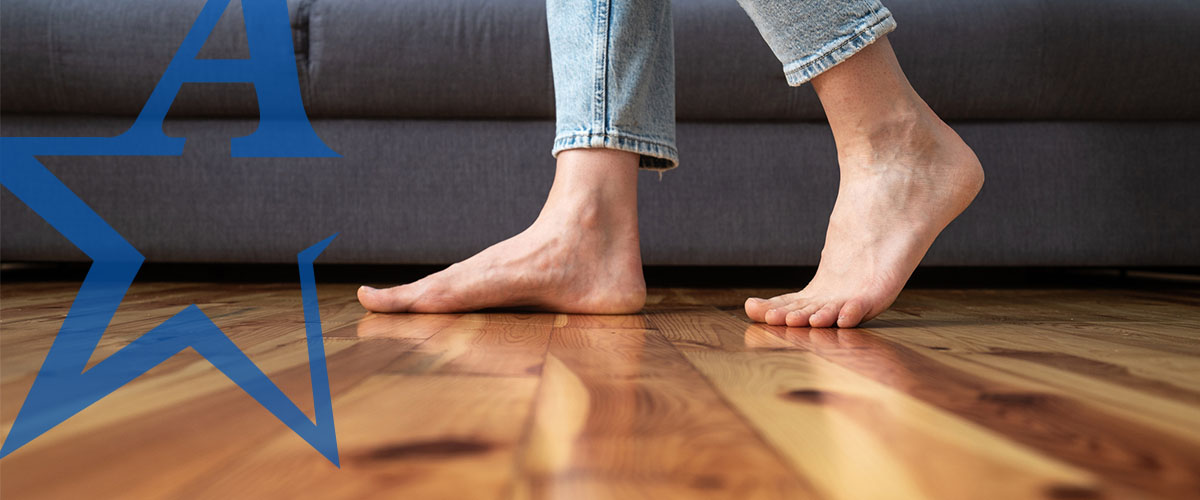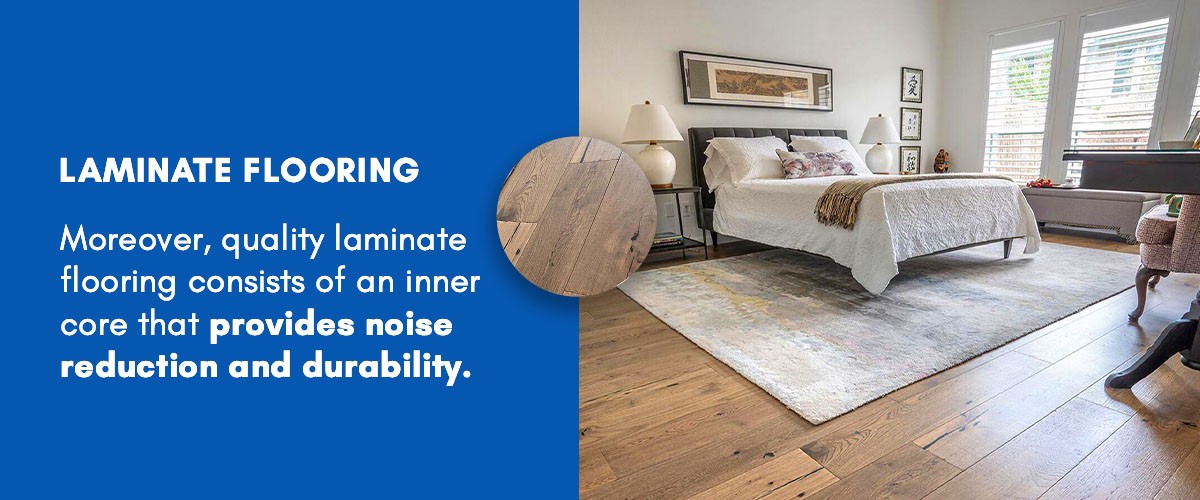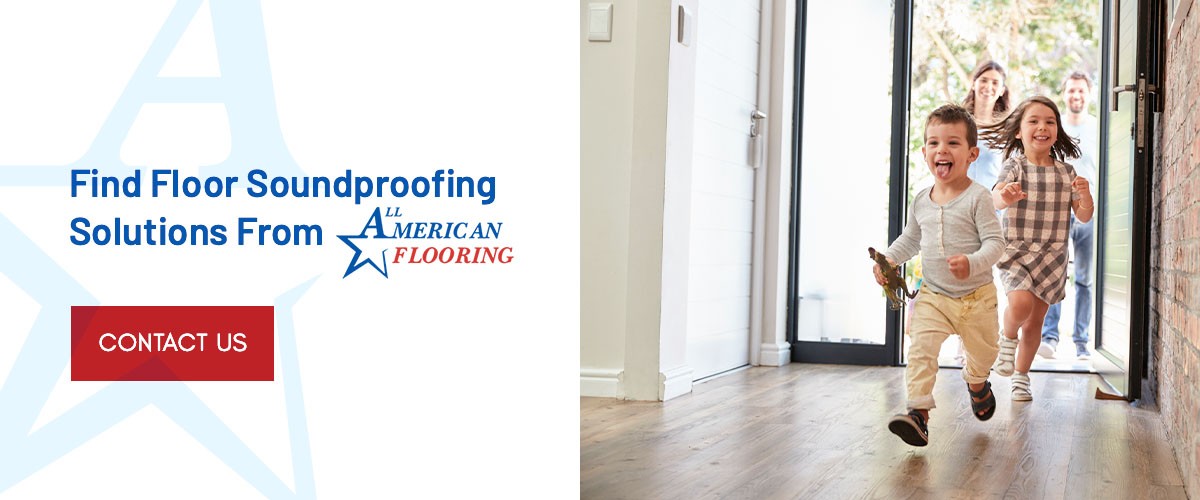Upstairs Floor Soundproofing Options

Soundproofing may not be the first thing that comes to mind when picking out flooring for your home. However, some types of flooring materials are noisier than others. If you decide to install hollow and noisy flooring upstairs, the sound of every footstep upstairs will be heard downstairs. Louder impact sounds like furniture movement and falling objects also become more prominent.
Fortunately, several solutions can ensure your floor absorbs sounds rather than amplifies them. Let’s review the best soundproofing options for upstairs flooring.
Carpeting
The dense, cushion-like composition of carpeting can effectively soften loud impact sounds. The fibers and air between them capture and dampen sounds, preventing noise from echoing between floor levels. From the sounds of chairs scraping to children jumping around, carpeting and quality underlayment carpet padding can thwart various noises from upstairs rooms.
Carpet padding underlayment options range from bonded and memory foam to synthetic fiber and felt. For optimal soundproofing effects, choose firmer padding for high-traffic areas like stairs and thicker bonded foam padding for rooms.
Beyond the general comfort carpeting offers, it is one of the more affordable flooring solutions to choose when soundproofing is a goal. Because carpeting is naturally soundproof, you won’t need to spend on extra sound-dampening layers. Even when you invest in padding underlayment, carpeting upstairs rooms is generally more affordable than soundproofing other types of flooring.
Laminate Flooring
Laminate flooring is an elegant yet affordable choice. However, like most hard flooring materials, laminate alone can cause impact and airborne noise to echo between floor levels. However, that doesn’t mean you can’t renovate your upstairs space with trendy laminate floors.
Some laminate floors are installed with an attached underlayment pad that absorbs impact sounds. Moreover, quality laminate flooring consists of an inner core that provides noise reduction and durability. You can also opt for an additional underlayment pad for maximum soundproofing benefits.

Laminate flooring is generally more affordable than carpeting. However, if you decide to add an additional underlayment pad, the costs of installing new upstairs floors will likely match the costs of carpeting.
Luxury Vinyl Tile (LVT)
LVT is a type of flooring that mimics the look and texture of natural wood or stone. While this flooring material contains several layers for optimal durability, it’s flexible and thin. LVT also offers fantastic soundproofing properties.
This innovative flooring is a worthwhile acoustic solution for upstairs rooms. You can also reinforce LVT with an extra layer of soundproofing, as with laminate and carpeting.
Vinyl and laminate flooring are similar in price. These materials are more affordable than other flooring types, like porcelain tiles and hardwood. However, LVT is generally more expensive as a higher-end material. Because you will need to invest in extra soundproofing layers, LVT flooring can be an expensive choice for upstairs rooms. Still, LVT is a worthwhile investment since it’s more durable than cheaper materials.
Hardwood Flooring
Hardwood floors are a timeless, elegant investment for any home. They can last decades with the right care. However, hardwood is notorious for being the noisiest flooring type. Harder wood varieties like maple, oak, hickory and ash are known for their deep, resonant sound properties.
While softer wood varieties like pine may be slightly quieter, you should invest in additional soundproofing measures if you install hardwood floors upstairs. The best approach is to install noise-dampening underlayment padding.
Hardwood flooring can be quite expensive. You will also need to weigh the costs of additional soundproofing materials for upstairs rooms. But if you decide to invest in hardwood, your flooring can last decades. You will need to refinish hardwood floors every 10 years, although you shouldn’t need to replace the flooring for at least three decades.
Advanced Techniques for Upstairs Floor Soundproofing
An attached padding underlayment can improve soundproofing for all flooring materials. However, some advanced soundproofing techniques can further maximize noise reduction between floor levels:
- Acoustic underlayment: This is a highly effective soundproofing material. It absorbs impact sounds and offers incredible noise reduction for any flooring type. Acoustic underlayment comes in various forms, including rubber, cork and foam. As one of the most effective soundproofing solutions, acoustic underlayment is more expensive. When choosing materials, keep in mind that rubber underlayment is most suitable for tiling. Cork is best for hardwood floors, and foam is recommended for carpeting.
- Felt underlayment: Felt underlayment is another product designed specifically for soundproofing floors. This dense, eco-friendly material works well with engineered hardwood and laminate flooring. It is less expensive than acoustic underlayment but more expensive than foam underlayment.
- Foam underlayment: This is the most affordable soundproofing material on the market. Polyurethane foam offers minimal insulation, though it is effective in dampening impact sounds. This type of underlayment can be used beneath most types of flooring. However, it is not the most suitable choice for high-traffic areas because it isn’t as durable as other materials.
In addition to a soundproofing underlayment, you can apply an acoustic sealant to fill gaps and spaces in the flooring. This finishing acoustic sealant creates an extra barrier to eliminate noise effectively.
Choosing a Soundproofing Solution
Whether you decide to carpet your upstairs rooms or invest in classy hardwood flooring, additional soundproofing techniques can promote a peaceful and tranquil space. Soundproofing solutions make it possible to install flooring that suits your budget and style preferences.
Here are essential factors to consider when selecting upstairs flooring:
- Budget: Both flooring materials and soundproofing underlayment come with varying price tags and soundproofing capabilities. When choosing the right materials, use your budget as a key indicator. As mentioned, carpeting offers optimal soundproofing, making this flooring solution a more affordable option. In contrast, hardwood flooring is a more expensive choice that requires extensive soundproofing solutions.
- Noise levels: Consider upstairs noise levels to evaluate your soundproofing needs. If you have pets, small children or a large family, investing in flooring and materials with superior soundproofing properties is wise.
- Aesthetic preferences: Consider your personal style preferences when choosing new flooring for upstairs rooms. Though some types of flooring may be cheaper or offer more soundproofing, it’s still important to choose floors that complement your home’s interiors and aesthetic preferences.
Find Floor Soundproofing Solutions From All American Flooring
All American Flooring stocks a wide range of high-quality flooring materials and carpeting pad underlayment. Our options include:
- Hardwood flooring.
- Laminate flooring.
- LVT flooring.
- Bonded foam carpet padding.
- Felt carpet padding.
- Synthetic fiber carpet padding.
- Memory foam carpet padding.
With more than 30 years of industry expertise, we can guide you through the process of choosing the most suitable flooring materials for your home, budget and soundproofing needs. Contact us online to learn more about our flooring solutions, or schedule a free in-home estimate today.



